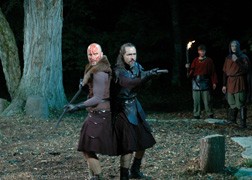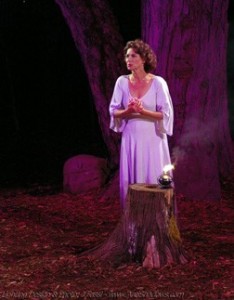Door Shakespeare’s “Macbeth:” True to the Spirit of the Play
- Share
- Tweet
- Pin
- Share

Photo by Jasson Fassl.
Sometimes in outdoor theater the weather wars against the action on stage. But on rare occasions Mother Nature seems to become so caught up in the production that we expect to find her listed in the program credits. Such was the case with a recent performance of Door Shakespeare’s Macbeth.
In most stagings of the play the audience is left to imagine the turbulent weather that accompanies the killing of King Duncan, as characters speak of the “rough night” and the “lamentings heard in the air.” In the gardens of Bjorklunden the gusts in the tree that canopies the stage area was a literal sound effect.
And as the plot thickens, Macbeth wading deeper and deeper into his river of blood, an evening fog rolled in, eerie wisps illuminated by the stage lights, as if in the wings Mother Nature was chuckling to herself, “What the play needs is a fog machine!”
Offering Macbeth to a vacationing summer theater audience is an ambitious undertaking, especially in a sometimes uncomfortable outdoor setting. But director Jason Economus was successful in not only engaging theatergoers but in keeping their attention for the duration of the play. After the curtain call, a woman sitting behind this writer announced to her friends, “I saw Macbeth in New York, and this was better!”
Reese Madigan’s Macbeth was a sympathetic villain in that the audience saw the vulnerability of the warrior hero; and rather than ranting his anger and frustration as he became entangled in his own wrongdoing, this Macbeth tended to understate the intensity of his feelings.
Lady Macbeth was fun to hate in the hands of Angela Iannone. Anyone who has seen the old Orson Wells Macbeth film will see parallels in the icy portrayals of Macbeth’s lover/nemesis.
While Macbeth’s emotions are often held in check, the sexual passion he shared with Lady Macbeth threatened to erupt on stage, suggesting a psychological link between sex and violence.
The lines “Double, double, toil and trouble” have become a part of pop culture, and the witches, perhaps the bard’s best-known characters. Economus capitalizes on their popularity by keeping the “three weird sisters” on stage for the duration of the play, a Greek chorus always watching, occasionally performing their parts as written and sometimes participating as other characters. Scholars debate whether the witches are active agents of evil, catalysts, or merely unsettling observers; these witches are clearly conjurers.
The performance had a strong visual appear, stage movement at times choreographed as if dance or ritual. The costumes, with flowing dresses and flapping kilts, added to the fluidity of the production, all enhanced by the live percussion/violin fragmentary incidental music and sound effects.
Shakespeare’s “two hour traffic of our stage” often becomes three or more in modern uncut productions. This show was well under two hours, even with an intermission. The story was told, but in an essential-Shakespeare style; the audience could follow the basic plot and enjoyed the poetry of famous passages. Few theatergoers, accustomed to the fast pace of contemporary theater, missed the cuts.
However, surgery is generally accompanied by loss. Purists who know the play well will ask, “What happened to the candle?” and newcomers will find this abridged version of the Scottish drama might not help them pass the test in their English class: “Didn’t the king have a second son?” A few times in the play (such as the assault on Macduff’s castle, the appearance of the ghost at the banquet, or the attacking army at the end) the cuts, along with double casting and interchanged characters, lead to confusion.
But that being said, Shakespeare, who was anything but a purist, would smile upon this production, as it reinforces the claim that he was “not of an age, but for all time.” Shakespeare was an entertainer who took liberties retelling the story of the historic Macbeth. Who is this writer to criticize Economus for taking a few with the fictional Macbeth!
Door Shakespeare’s Macbeth is true to the spirit of the play and not only makes the story accessible to a modern audience, but entertains them as well.
Door Shakespeare presents Macbeth on Tuesdays, Thursdays, Saturdays; and Love’s Labour’s Lost on Mondays, Wednesdays, Fridays through Aug. 17. For information call 920.839.1500 or visit doorshakespeare.com.

